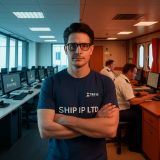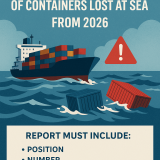Safety solutions provider Survitec has launched a unique service for the marine industry that provides a streamlined supply chain process for critical firefighting and other lifesaving products.
Called Survitec Essentials, the new service addresses the need for marine operators to have predictable and convenient access to essential safety products at major maritime hubs around the world. Survitec Essentials ensures the availability of a consistent range of products critical to maritime safety at short lead-times with fixed prices at 12 ports worldwide. Ports include London, Hamburg, Rotterdam, Algeciras, Piraeus, Colon, Barcelona, Houston, Fujairah, Shanghai, Singapore, and Busan.
Finn Lende-Harung, Survitec Product Category Manager – Fire, said: “This is a completely new approach for the commercial maritime industry. Survitec Essentials offers a consistent range of quality safety products at a fixed price at key ports along the global trading routes. This makes it easier for ship managers to budget and plan ahead. For the crew, it simplifies the training, service, and spare parts regime. With Survitec Essentials, we have addressed the ship managers’ supply chain challenges and worked to simplify them. With a fixed price arrangement across 12 key ports, ship managers no longer need to worry about exchange rates, quotes on a case-by-case basis, or multi-currency transactions. If a vessel operated out of Greece needs equipment in, say, Singapore or Panama, the company simply contacts their local customer service in Piraeus. This provides the customer coordination from one point of contact in the same time zone, speaking their native language for all ports. Furthermore, the prices are fixed in the customers’ preferred currency, procured through one entity and handled through one bank account, further simplifying the procurement process.”
Addressing the procurement challenges ship operators and crews currently face, Survitec Technical Sales Manager Wim van Iperen elaborated, “You can go onboard a ship and find several brands providing different versions of the same piece of kit, different versions of the same spares and accessories and different manuals and instructions, possibly in several languages. Crews need to match all of these elements when they come to maintain, service or use the equipment. This not only increases stock inventories onboard, but can be confusing, time consuming and complicated for crews. Now, with the Survitec Essentials range of more than 70 essential safety products, including spares and accessories, operators can be assured of having the products they need, where they need them, to stay safe and compliant, whilst also removing unnecessary complexities surrounding the management of safety equipment onboard.”
“Take a CO2 fire-extinguisher,” Iperen added. “With Survitec Essentials, the extinguisher, parts and instructions/manuals will be exactly the same across all the ports in the programme. No one else is doing this, certainly not on such a global scale. The further benefits are huge”.















